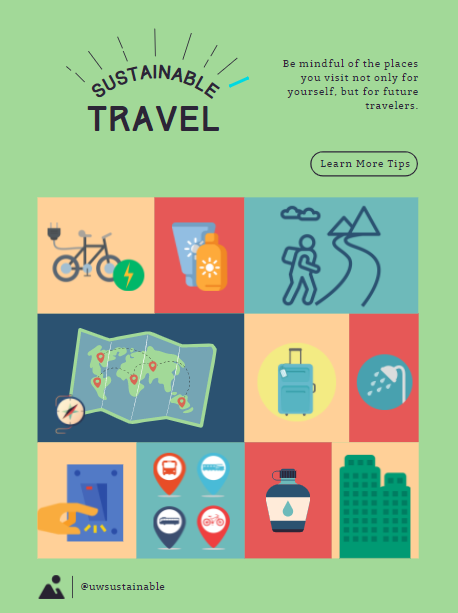Understanding the Impact of Travel
Our wanderlust, that innate desire to explore the world, comes at a cost. Traditional tourism, often fueled by cheap flights and mass-market packages, contributes significantly to carbon emissions, environmental degradation, and the exploitation of local communities. The sheer volume of tourists in popular destinations puts a strain on resources like water and energy, damages delicate ecosystems, and can lead to the erosion of local cultures. It’s time to acknowledge this impact and seek more responsible alternatives.
Choosing Sustainable Transportation
The biggest contributor to travel’s carbon footprint is often transportation. Flying, while convenient, is incredibly energy-intensive. Consider alternative options like trains, buses, or even cycling and walking where feasible. Slow travel allows for deeper immersion in a destination and reduces your environmental impact. If flying is unavoidable, opt for direct flights to reduce emissions and consider offsetting your carbon footprint through reputable organizations that invest in verified environmental projects.

Supporting Local Communities and Businesses
Instead of relying on large international hotel chains, seek out locally owned guesthouses, homestays, or eco-lodges. These smaller businesses often reinvest profits directly into the community, supporting local economies and preserving cultural heritage. Similarly, prioritize local restaurants and markets for your meals and souvenirs. This ensures that your tourism dollars stay within the community and benefit the people who call it home, rather than lining the pockets of multinational corporations.
Minimizing Your Environmental Footprint
While traveling, make a conscious effort to reduce your waste. Carry a reusable water bottle, coffee cup, and shopping bag. Avoid single-use plastics as much as possible. Respect the natural environment by staying on marked trails, properly disposing of waste, and avoiding the disturbance of wildlife. Small actions, when multiplied across many travelers, can make a significant difference in protecting fragile ecosystems.
Respecting Local Cultures and Traditions
Responsible travel involves respecting the local culture and traditions of the places you visit. This means learning a few basic phrases in the local language, dressing respectfully, being mindful of local customs and etiquette, and avoiding behaviors that might be considered offensive or intrusive. Engage with the local community respectfully and avoid activities that exploit or commodify local culture, such as participating in unethical wildlife encounters.
Planning Ahead for a Sustainable Trip
Before embarking on your journey, do your research. Choose destinations and activities that align with your values of sustainability and responsible travel. Read reviews to identify businesses with strong environmental and social commitments. Plan your itinerary thoughtfully, considering travel times and distances to minimize your carbon footprint. Pack lightly to reduce the weight and fuel consumption of your transportation. By being a well-informed and conscientious traveler, you can contribute to a more sustainable future for tourism.
The Power of Conscious Consumption
Sustainable travel is not just about minimizing your negative impact; it’s also about maximizing your positive contribution. Consider volunteering your time with local environmental or community projects, supporting fair-trade initiatives, or purchasing souvenirs directly from artisans. By making conscious choices about where you spend your money and time, you can contribute to the economic and social well-being of the communities you visit, fostering a more equitable and sustainable tourism industry for generations to come.
Embracing Slow Travel and Immersive Experiences
The modern obsession with “bucket-list” travel often leads to hurried journeys and superficial experiences. Instead, embrace slow travel, allowing ample time to explore a destination thoroughly and engage meaningfully with its culture and people. This allows for a more profound and enriching experience, while also reducing the environmental impact associated with constant travel between locations. Immerse yourself in the local life, connect with the community, and savor the journey itself.
Becoming an Advocate for Sustainable Tourism
Share your experiences and knowledge with others. Encourage your friends and family to adopt more sustainable travel practices. Support organizations working to promote responsible tourism and advocate for policies that protect our planet and its people. By spreading awareness and promoting responsible travel, we can collectively work towards a more sustainable and equitable future for tourism, ensuring that future generations can enjoy the wonders of our planet without compromising its integrity. Read more about what is sustainable travel.



